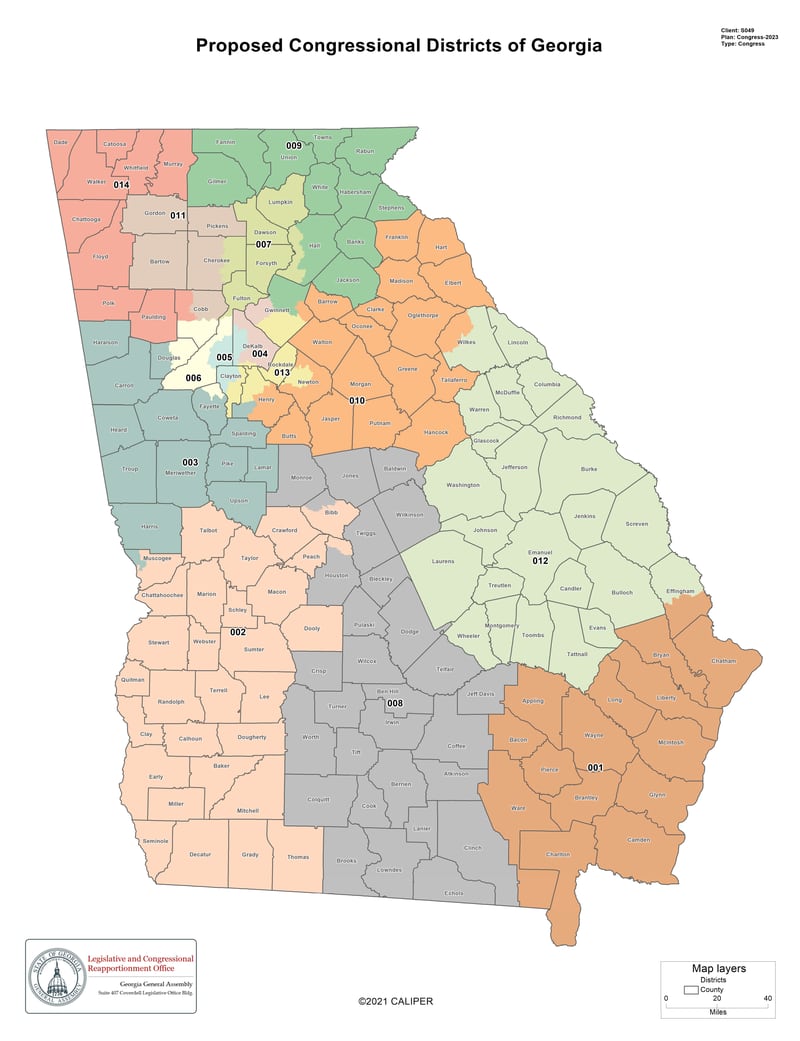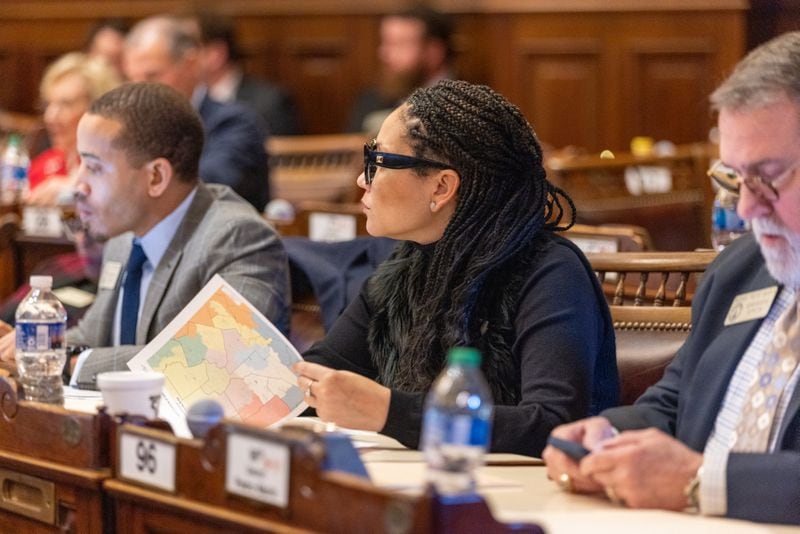A federal judge upheld Georgia’s new political districts that preserve Republican power, ruling Thursday that state legislators “fully complied” with his order to create more districts with a majority of Black voters.
The decision leaves in place political maps safeguarding the Republican Party’s 9-5 advantage in Georgia’s U.S. House delegation and its majorities in the General Assembly. These district lines will likely be used in next year’s elections.
U.S. District Judge Steve Jones rejected claims that Republican legislators violated his October ruling that threw out the state’s district lines drawn two years ago. Jones had decided that the old maps illegally diluted Black voting strength, but his decision Thursday upholds the state’s redrawn districts.
Plaintiffs in the case had argued that the new maps illegally disenfranchised Black voters by carving up a multiracial Atlanta-area district held by Democratic U.S. Rep. Lucy McBath, but Jones rebuffed that argument.
“Redistricting decisions by a legislative body with an eye toward securing partisan advantage does not alone violate” the Voting Rights Act, wrote Jones, who was appointed by President Barack Obama. “... The court finds that the General Assembly fully complied with this court’s order requiring the creation of a majority-Black congressional district in the region of the state where vote dilution was found.”
While the decision is likely to be appealed, Jones’ 15-page ruling settles the case for now after the General Assembly’s Republican majority crafted new districts during a special session that ended this month.
“Today’s ruling is a validation of what we put forward,” said state House Speaker Jon Burns, a Republican from Newington. “Now we’re going to get back to the work of lowering costs of living, improving education, expanding access to health care and delivering results for the people of Georgia.”
Plaintiffs in the case, including civil rights organizations and religious groups, said they will continue to seek different maps.
“We believe that these maps continue to violate ... the Voting Rights Act and dilute the voting strength of Black voters,” said Rahul Garabadu, an attorney for the American Civil Liberties Union of Georgia. “But no matter what, our fight to ensure fair voting practices in Georgia will continue.”
Under the redrawn maps, the state added districts with a majority of Black voters, but without threatening the balance of political power. Jones ruled that legislators followed his requirement for an additional majority-Black congressional district in the western part of metro Atlanta, even though they did so without adding opportunities for greater representation of Black voters.
Lawmakers also complied with his order to create two more Black state Senate districts and five more Black state House districts, Jones ruled.
Jones’ decision arrived before a late January deadline for maps to be in place so election officials will have enough time to prepare for next year’s primary election.
Credit: Special
Credit: Special
“Judge Jones’ ruling today allows Georgia election officials to continue their preparations for a smooth, secure 2024 election with a little more certainty,” said Republican Secretary of State Brad Raffensperger, the defendant in the case.
Jones ordered legislators to remap the state after determining that the maps drawn in 2021 did not account for the fact that the state’s Black population boomed and its white population declined after 2010. Jones found that the previous maps violated the Voting Rights Act of 1965, which prohibits racial discrimination in elections.
Before Georgia’s Republican majority redistricted the state two years ago, the GOP held eight of Georgia’s 14 seats in the U.S. House, but Republicans shaped districts in a way that virtually guaranteed they’d retake a seat in the next elections.
During a hearing last week, the plaintiffs argued that the maps illegally altered the 7th Congressional District held by McBath, who is Black. Nonwhite voters make up a majority in that district, but no single race represents more than half of its population.
Jones had said in his October ruling that lawmakers couldn’t eliminate any existing “minority opportunity districts,” though he didn’t define the term in his order. Opportunity districts are generally defined as areas where racial minority groups are able to elect their preferred candidates by attracting some support from white voters.
Credit: arvin.temkar@ajc.com
Credit: arvin.temkar@ajc.com
Jones wrote in his order Thursday that the case focused on the rights of Black voters — not voters of other races. A separate lawsuit would be needed to contest Georgia’s districts based on a claim that they illegally dilute the rights of coalitions of nonwhite voters, Jones wrote.
“From its onset, however, this case has been about Black voters,” Jones said in his ruling. “This court has made no finding that Black voters in Georgia politically join with another minority group or groups and that white voters vote as a bloc to defeat the candidate of choice of that minority coalition.”
Besides maintaining Republicans’ two-thirds control of Georgia’s representation in the U.S. House, the redistricting also insulates the GOP’s 33-23 lead in the state Senate and 102-78 edge in the state House.
Under the new maps, every Senate incumbent is protected and Republicans might lose an estimated two seats in the state House in next year’s elections.
“The Georgia Senate worked diligently during our special session last month to make the changes that Judge Jones requested,” said state Senate Majority Leader Steve Gooch, a Republican from Dahlonega. “We are pleased that he has agreed to the new maps we have adopted and look forward to the election process in the coming year.”
Now that Georgia’s districts are set, McBath announced Thursday that she plans to run in the newly created majority-Black 6th Congressional District, which includes parts of Cobb, Douglas, Fayette and Fulton counties.
During redistricting, Republicans altered McBath’s 7th Congressional District, which was 30% white and 28% Black, instead making it 64% white and 8% Black. Black voters overwhelmingly support Democrats in Georgia while most white voters back Republicans.
“I refuse to allow an extremist few Republicans to decide when my work in Congress is finished,” McBath said. “I will be running for reelection to Congress in GA-06 because too much is at stake to stand down.”
The 6th District is currently held by Republican U.S. Rep. Rich McCormick, who is expected to run in the redrawn 7th District.
Regardless of who runs and where, Republican control of Georgia’s U.S. House seats and the General Assembly is assured during next year’s elections.
But in the 2024 presidential election — a statewide race without district lines that give Republicans an edge — the contest is expected to be much closer.
Georgia remains a competitive state where Democrat Joe Biden defeated Republican Donald Trump in the 2020 election by 12,000 votes, a 0.24 percentage point margin.









